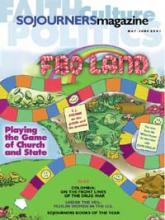‘Fewer in San Francisco Go to Church." There it was—top and center of San Francisco's largest daily newspaper—further evidence of the demise of interest in religion.
The news story was occasioned by the release of "Civic Engagement in America," a national survey launched by professor Robert Putnam of the John F. Kennedy School of Government at Harvard University. Researchers interviewed more than 30,000 people across the country to discover how often they interact with others by volunteering at food banks, attending club meetings, going to parades, donating blood, worshipping, and even playing board games with friends at home.
Putnam is best known for his celebrated 1995 journal article (and subsequent book) "Bowling Alone." In a nutshell, he argued that civil society was breaking down as Americans become more disconnected from their families, neighbors, communities, and the republic itself. The very organizations that breathe life into democracy are fraying. Bowling is his driving metaphor. Years ago thousands of people belonged to bowling leagues. Today they're more likely to bowl alone.
Putnam aims to determine a region's "social capital"—that is, the currency that enables individuals to come together and achieve common goals. His new survey reveals that participation in a religious community and civic activity correlates strongly in much of the country. Not so in northern California, where social and political activity is high despite low religious membership.
These results raise my suspicion about Putnam's thesis. Fewer people today are walking around with their names embroidered on a "Lucky's Bowl" shirt; a tragic loss of fashion, to be sure, but does it necessarily spell the end of the republic?
Read the Full Article
